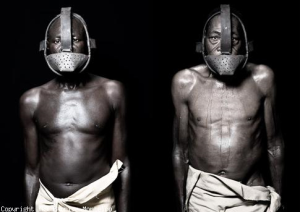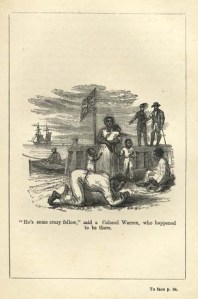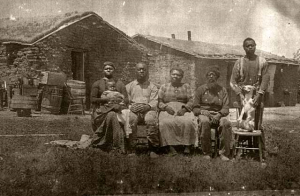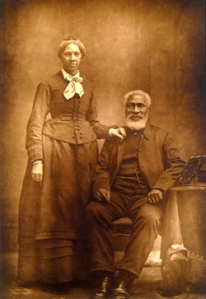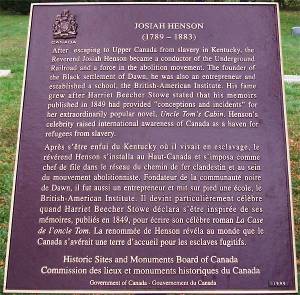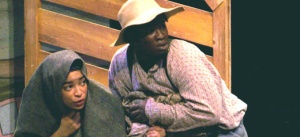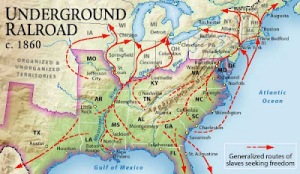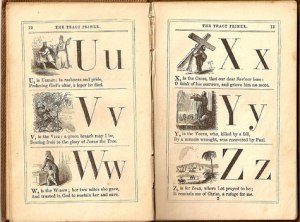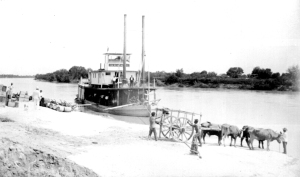Run to Freedom – Reference and Research Notes
The Fugitive Slave Act – 1850
Fugitive Slave Law of 1850
From Wikipedia, the free encyclopedia
An April 24, 1851 poster warning colored people in Boston about policemen acting as slave catchers.
The Fugitive Slave Law or Fugitive Slave Act was passed by the United States Congress on September 18, 1850, as part of the Compromise of 1850 between Southern slaveholding interests and Northern Free-Soilers and abolitionists.
One cause of conflict between the Southern slave states and the Northern free states was the lack of assistance given by northerners to southern slave-owners and their agents seeking to recapture escaped slaves. Southerners interpreted this as support for abolitionism and a refusal to respect southern states’ rights.
New law
In response to the weakening of this first fugitive slave act, the Fugitive Slave Bill of 1850 made any federal marshal or other official who did not arrest an alleged runaway slave liable to a fine of $1,000. Law-enforcement officials everywhere had a duty to arrest anyone suspected of being a runaway slave on no more evidence than a claimant’s sworn testimony of ownership. The suspected slave could not ask for a jury trial or testify on his or her own behalf. In addition, any person aiding a runaway slave by providing food or shelter was to be subject to six months’ imprisonment and a $1,000 fine. Officers capturing a fugitive slave were entitled to a fee for their work.
Effects
In fact the Fugitive Slave Law brought the issue home to anti-slavery citizens in the North, since it made them and their institutions responsible for enforcing slavery. Even moderate abolitionists were now faced with the immediate choice of defying what they believed an unjust law or breaking with their own conscience and belief. The case of Anthony Burns fell under this statute.
Many Methodists were highly active in the abolition movement, though the Methodist Episcopal Church was officially reluctant to touch the issue because it did not want to fan the flames of inter-sectional hatreds after the Southern wing split off in 1844. Two splinter groups of Methodism, the Wesleyan Church in 1843 and the Free Methodists in 1860, along with many like-minded Quakers, maintained some of the “stations” of the Underground Railroad. Most of the stations were maintained by African Americans.
The Fugitive Slave Act brought a defiant response from abolitionists. Reverend Luther Lee, pastor of the Wesleyan Methodist Church of Syracuse, New York wrote in 1855:
I never would obey it. I had assisted thirty slaves to escape to Canada during the last month. If the authorities wanted any thing of me my residence was at 39 Onondaga Street. I would admit that and they could take me and lock me up in the Penitentiary on the hill; but if they did such a foolish thing as that I had friends enough on Onondaga County to level it to the ground before the next morning.
Other opponents such as African American leader Harriet Tubman simply treated the law as just another complication in their activities. The most important reaction was making the neighboring country of Canada the main destination of choice for runaway slaves. Only a few hundred runaways made it to Canada in the 1850s.
With the outbreak of the American Civil War, General Benjamin Butler justified refusing to return runaway slaves in accordance to this law because the Union and the Confederacy were at war, the slaves could be confiscated and set free as contraband of war.
Annulment
In March 1862, Congress forbade all Union army officers from returning fugitive slaves, with the passage of the Act Prohibiting the Return of Slaves, effectively annulling the Fugitive Slave Law.
The Compromise of 1850 was introduced to stave off conflict between the slave states and the free states upon the admission of California as a state. Under the Compromise, California was admitted as a free state, New Mexico and Utah were organized as slave territories, and Texas had its boundaries set. Another part of the Compromise was the Fugitive Slave Act, which federalized the return of escaped slaves to their owners.
It is an offensive piece of legislation to us today, even if one takes the issue of race out of it. Slaves, of course, had no rights – they were guilty by virtue of a slave-owner’s say-so, there was very little burden of proof, the federal government bore most of the costs of returning escaped slaves, and non-slaves who helped fugitive slaves were subject to harsh fines and prison.
Resistance to the law in the North grew a fever pitch, with President Fillmore calling out the army to quell some mobs and to return some former slaves caught in the North.
As defiance of the law in the North became more and more open and more and more fervent, the anger of the South grew and grew, adding to a general feeling of discontent.
__ ______________________________________
______________________________________
Actual text of law:
Be it enacted by the Senate and House of Representatives of the United States of America in Congress assembled, That the persons who have been, or may hereafter be, appointed commissioners, in virtue of any act of Congress, by the Circuit Courts of the United States, and Who, in consequence of such appointment, are authorized to exercise the powers that any justice of the peace, or other magistrate of any of the United States, may exercise in respect to offenders for any crime or offense against the United States, by arresting, imprisoning, or bailing the same under and by the virtue of the thirty-third section of the act of the twenty-fourth of September seventeen hundred and eighty-nine, entitled “An Act to establish the judicial courts of the United States” shall be, and are hereby, authorized and required to exercise and discharge all the powers and duties conferred by this act.
§ 2. And be it further enacted, That the Superior Court of each organized Territory of the United States shall have the same power to appoint commissioners to take acknowledgments of bail and affidavits, and to take depositions of witnesses in civil causes, which is now possessed by the Circuit Court of the United States; and all commissioners who shall hereafter be appointed for such purposes by the Superior Court of any organized Territory of the United States, shall possess all the powers, and exercise all the duties, conferred by law upon the commissioners appointed by the Circuit Courts of the United States for similar purposes, and shall moreover exercise and discharge all the powers and duties conferred by this act.
§ 3. And be it further enacted, That the Circuit Courts of the United States shall from time to time enlarge the number of the commissioners, with a view to afford reasonable facilities to reclaim fugitives from labor, and to the prompt discharge of the duties imposed by this act.
§ 4. And be it further enacted, That the commissioners above named shall have concurrent jurisdiction with the judges of the Circuit and District Courts of the United States, in their respective circuits and districts within the several States, and the judges of the Superior Courts of the Territories, severally and collectively, in term-time and vacation; shall grant certificates to such claimants, upon satisfactory proof being made, with authority to take and remove such fugitives from service or labor, under the restrictions herein contained, to the State or Territory from which such persons may have escaped or fled.
§ 5. And be it further enacted, That it shall be the duty of all marshals and deputy marshals to obey and execute all warrants and precepts issued under the provisions of this act, when to them directed; and should any marshal or deputy marshal refuse to receive such warrant, or other process, when tendered, or to use all proper means diligently to execute the same, he shall, on conviction thereof, be fined in the sum of one thousand dollars, to the use of such claimant, on the motion of such claimant, by the Circuit or District Court for the district of such marshal; and after arrest of such fugitive, by such marshal or his deputy, or whilst at any time in his custody under the provisions of this act, should such fugitive escape, whether with or without the assent of such marshal or his deputy, such marshal shall be liable, on his official bond, to be prosecuted for the benefit of such claimant, for the full value of the service or labor of said fugitive in the State, Territory, or District whence he escaped: and the better to enable the said commissioners, when thus appointed, to execute their duties faithfully and efficiently, in conformity with the requirements of the Constitution of the United States and of this act, they are hereby authorized and empowered, within their counties respectively, to appoint, in writing under their hands, any one or more suitable persons, from time to time, to execute all such warrants and other process as may be issued by them in the lawful performance of their respective duties; with authority to such commissioners, or the persons to be appointed by them, to execute process as aforesaid, to summon and call to their aid the bystanders, or posse comitatus of the proper county, when necessary to ensure a faithful observance of the clause of the Constitution referred to, in conformity with the provisions of this act; and all good citizens are hereby commanded to aid and assist in the prompt and efficient execution of this law, whenever their services may be required, as aforesaid, for that purpose; and said warrants shall run, and be executed by said officers, any where in the State within which they are issued.
§ 6. And be it further enacted, That when a person held to service or labor in any State or Territory of the United States, has heretofore or shall hereafter escape into another State or Territory of the United States, the person or persons to whom such service or labor may be due, or his, her, or their agent or attorney, duly authorized, by power of attorney, in writing, acknowledged and certified under the seal of some legal officer or court of the State or Territory in which the same may be executed, may pursue and reclaim such fugitive person, either by procuring a warrant from some one of the courts, judges, or commissioners aforesaid, of the proper circuit, district, or county, for the apprehension of such fugitive from service or labor, or by seizing and arresting such fugitive, where the same can be done without process, and by taking, or causing such person to be taken, forthwith before such court, judge, or commissioner, whose duty it shall be to hear and determine the case of such claimant in a summary manner; and upon satisfactory proof being made, by deposition or affidavit, in writing, to be taken and certified by such court, judge, or commissioner, or by other satisfactory testimony, duly taken and certified by some court, magistrate, justice of the peace, or other legal officer authorized to administer an oath and take depositions under the laws of the State or Territory from which such person owing service or labor may have escaped, with a certificate of such magistracy or other authority, as aforesaid, with the seal of the proper court or officer thereto attached, which seal shall be sufficient to establish the competency of the proof, and with proof, also by affidavit, of the identity of the person whose service or labor is claimed to be due as aforesaid, that the person so arrested does in fact owe service or labor to the person or persons claiming him or her, in the State or Territory from which such fugitive may have escaped as aforesaid, and that said person escaped, to make out and deliver to such claimant, his or her agent or attorney, a certificate setting forth the substantial facts as to the service or labor due from such fugitive to the claimant, and of his or her escape from the State or Territory in which he or she was arrested, with authority to such claimant, or his or her agent or attorney, to use such reasonable force and restraint as may be necessary, under the circumstances of the case, to take and remove such fugitive person back to the State or Territory whence he or she may have escaped as aforesaid. In no trial or hearing under this act shall the testimony of such alleged fugitive be admitted in evidence; and the certificates in this and the first [fourth] section mentioned, shall be conclusive of the right of the person or persons in whose favor granted, to remove such fugitive to the State or Territory from which he escaped, and shall prevent all molestation of such person or persons by any process issued by any court, judge, magistrate, or other person whomsoever.
§ 7. And be it further enacted, That any person who shall knowingly and willingly obstruct, hinder, or prevent such claimant, his agent or attorney, or any person or persons lawfully assisting him, her, or them, from arresting such a fugitive from service or labor, either with or without process as aforesaid, or shall rescue, or attempt to rescue, such fugitive from service or labor, from the custody of such claimant, his or her agent or attorney, or other person or persons lawfully assisting as aforesaid, when so arrested, pursuant to the authority herein given and declared; or shall aid, abet, or assist such person so owing service or labor as aforesaid, directly or indirectly, to escape from such claimant, his agent or attorney, or other person or persons legally authorized as aforesaid; or shall harbor or conceal such fugitive, so as to prevent the discovery and arrest of such person, after notice or knowledge of the fact that such person was a fugitive from service or labor as aforesaid, shall, for either of said offences, be subject to a fine not exceeding one thousand dollars, and imprisonment not exceeding six months, by indictment and conviction before the District Court of the United States for the district in which such offence may have been committed, or before the proper court of criminal jurisdiction, if committed within any one of the organized Territories of the United States; and shall moreover forfeit and pay, by way of civil damages to the party injured by such illegal conduct, the sum of one thousand dollars for each fugitive so lost as aforesaid, to be recovered by action of debt, in any of the District or Territorial Courts aforesaid, within whose jurisdiction the said offence may have been committed.
§ 8. And be it further enacted, That the marshals, their deputies, and the clerks of the said District and Territorial Courts, shall be paid, for their services, the like fees as may be allowed for similar services in other cases; and where such services are rendered exclusively in the arrest, custody, and delivery of the fugitive to the claimant, his or her agent or attorney, or where such supposed fugitive may be discharged out of custody for the want of sufficient proof as aforesaid, then such fees are to be paid in whole by such claimant, his or her agent or attorney; and in all cases where the proceedings are before a commissioner, he shall be entitled to a fee of ten dollars in full for his services in each case, upon the delivery of the said certificate to the claimant, his agent or attorney; or a fee of five dollars in cases where the proof shall not, in the opinion of such commissioner, warrant such certificate and delivery, inclusive of all services incident to such arrest and examination, to be paid, in either case, by the claimant, his or her agent or attorney. The person or persons authorized to execute the process to be issued by such commissioner for the arrest and detention of fugitives from service or labor as aforesaid, shall also be entitled to a fee of five dollars each for each person he or they may arrest, and take before any commissioner as aforesaid, at the instance and request of such claimant, with such other fees as may be deemed reasonable by such commissioner for such other additional services as may be necessarily performed by him or them; such as attending at the examination, keeping the fugitive in custody, and providing him with food and lodging during his detention, and until the final determination of such commissioners; and, in general, for performing such other duties as may be required by such claimant, his or her attorney or agent, or commissioner in the premises, such fees to be made up in conformity with the fees usually charged by the officers of the courts of justice within the proper district or county, as near as may be practicable, and paid by such claimants, their agents or attorneys, whether such supposed fugitives from service or labor be ordered to be delivered to such claimant by the final determination of such commissioner or not.
§ 9. And be it further enacted, That, upon affidavit made by the claimant of such fugitive, his agent or attorney, after such certificate has been issued, that he has reason to apprehend that such fugitive will he rescued by force from his or their possession before he can be taken beyond the limits of the State in which the arrest is made, it shall be the duty of the officer making the arrest to retain such fugitive in his custody, and to remove him to the State whence he fled, and there to deliver him to said claimant, his agent, or attorney. And to this end, the officer aforesaid is hereby authorized and required to employ so many persons as he may deem necessary to overcome such force, and to retain them in his service so long as circumstances may require. The said officer and his assistants, while so employed, to receive the same compensation, and to be allowed the same expenses, as are now allowed by law for transportation of criminals, to be certified by the judge of the district within which the arrest is made, and paid out of the treasury of the United States.
§ 10. And be it further enacted, That when any person held to service or labor in any State or Territory, or in the District of Columbia, shall escape therefrom, the party to whom such service or labor shall be due, his, her, or their agent or attorney, may apply to any court of record therein, or judge thereof in vacation, and make satisfactory proof to such court, or judge in vacation, of the escape aforesaid, and that the person escaping owed service or labor to such party. Whereupon the court shall cause a record to be made of the matters so proved, and also a general description of the person so escaping, with such convenient certainty as may be; and a transcript of such record, authenticated by the attestation of the clerk and of the seal of the said court, being produced in any other State, Territory, or district in which the person so escaping may be found, and being exhibited to any judge, commissioner, or other office, authorized by the law of the United States to cause persons escaping from service or labor to be delivered up, shall be held and taken to be full and conclusive evidence of the fact of escape, and that the service or labor of the person escaping is due to the party in such record mentioned. And upon the production by the said party of other and further evidence if necessary, either oral or by affidavit, in addition to what is contained in the said record of the identity of the person escaping, he or she shall be delivered up to the claimant, And the said court, commissioner, judge, or other person authorized by this act to grant certificates to claimants or fugitives, shall, upon the production of the record and other evidences aforesaid, grant to such claimant a certificate of his right to take any such person identified and proved to be owing service or labor as aforesaid, which certificate shall authorize such claimant to seize or arrest and transport such person to the State or Territory from which he escaped: Provided, That nothing herein contained shall be construed as requiring the production of a transcript of such record as evidence as aforesaid. But in its absence the claim shall be heard and determined upon other satisfactory proofs, competent in law.
Approved, September 18, 1850.
________________________________________
* “Whosoever shall make use of language in any public discourse from the bar, the bench, the stage, the pulpit, or in any place whatsoever; or whoever shall make use of language in private discourses or conversations, or shall make use of signs or actions having a tendency to produce discontent among the free coloured population of this State, or to excite insubordination among the slaves; or whosoever shall knowingly be instrumental in bringing into this State any paper, pamphlet, or book, having such tendency as aforesaid, shall, on conviction thereof, before any court of competent jurisdiction, suffer imprisonment at hard labour not less than three years, nor more than twenty-one years; or death, at the discretion of the court.”–Revised Statutes of Louisiana.
.
• They still had some prejudices to overcome in Canada. from Josiah Henson’s memoirs
We have a great amount of prejudice to contend with, in that part of Canada. So much so, that our children are not permitted to attend the common schools with the white children of that town; yet we are taxed for school purposes. My own children were turned out of the common school at Windsor. One of the trustees gave orders that the teacher should not allow them to recite their lessons. I continued to send them for several days, until my eldest daughter complained to me so bitterly that I told them both that they might cease going to the school-house. I called to see the trustee who had thus prevented the instruction of my children: he is a Scotchman, by the name of Bartlett. His excuse was that others complained: he was quite willing that my children should attend school with his. I told him what I thought of the whole matter. I suppose my manner of expression was harsh: if it was not, I confess I felt as if it ought to be harsh. It is not that I think, for one moment, that it would be an honour for my children to be associated with these Windsor children: I am not so badly off for honour as to be driven to seek it from that quarter
Rev 6:10 They cried with a loud voice, saying, How long, O Lord, holy and true, dost thou not judge and avenge our blood on them that dwell on the earth?
Rev 6:11 And white robes were given unto every one of them; and it was said unto them, that they should rest yet for a little season, until their fellowservants also and their brethren, that should be killed as they were, should be fulfilled.
Rev 8:3 And another angel came and stood at the altar, having a golden censer; and there was given unto him much incense, that he should offer it with the prayers of all saints upon the golden altar which was before the throne.
Rev 8:4 And the smoke of the incense, which came with the prayers of the saints, ascended up before God out of the angel’s hand.
Rev 8:5 And the angel took the censer, and filled it with fire of the altar, and cast it into the earth: and there were voices, and thunderings, and lightnings, and an earthquake.
Notes on the Commerce vessel
With the help of computerized vessel records and the clues given in the text it is most likely the vessel which brought Josiah Henson to Buffalo was the two-masted schooner “Commerce” of Buffalo, built at Sandusky, Ohio in 1825. The 72-foot-long vessel was enrolled at the Port of Buffalo in September 1830 with John Burnham as Captain. (Hiram Pratt of Buffalo was an owner.) In 1836, John Burnham was captain of the steamboat William Penn. He died in Buffalo in 1837.
“The sufferings of the past are now like a dream, and the enduring lessons left behind make me to praise God that my soul has been tempered by him in so fiery a furnace and under such heavy blows.”
Just as demand for slaves was increasing, supply was restricted. The United States Constitution, adopted in 1787, prevented Congress from banning the importation of slaves before 1808. On January 1, 1808, Congress acted to ban further imports. Any new slaves would have to be descendants of ones that were currently in the U.S. However, the internal U.S. slave trade, and the involvement in the international slave trade or the outfitting of ships for that trade by U.S. citizens, were not banned. Though there were certainly violations of this law, slavery in America became more or less self-sustaining; the overland ‘slave trade’ from Tidewater, Virginia, and the Carolinas to Georgia, Alabama, and Texas continued for another half-century.
How the term Underground Railroad came to be:
The “Railroad” had actually been operating for
years before it received its name. In 1831 a slave
named Tice Davids escaped from Kentucky. He came to the Ohio River, plunged in, and managed to swim across. His master was close on his heels, and finding a skiff, rowed after the bobbing head in the water. He was swiftly overtaking Tice when the slave touched bottom and waded ashore near the little town of Ripley. It seemed to the master only a matter of moments now until he would overtake him. But the slave disappeared, and though he was dripping wet, there was no trace of him anywhere. His master searched the locality in vain, and said ruefully, “He
must have gotten away by an underground road.”
In those days the steam railroad was new, and to
many people mysterious. The supposition that per-
haps a “railroad” figured in some way in the escape
system was welcomed by the Quakers, whose activ-
ities must necessarily be veiled and secret. So the
friends of escaping slaves completed the phrase,
making it “The Underground Railroad,” under which
name the system operated until slaves were totally
freed by the Civil War.
Additional North Star notes
This type of axis movement is similar to that of a spinning top. As the top slows, the axis of rotation changes as the top draws out each rotation; that is to say that the stem of the top itself traces out a circular pattern rather than pointing at a single spot or staying mostly still. If you draw an imaginary line of the earth’s axis and continue it up to the sky, it will make a similar path. This type of axis rotation is called precession.
In the case of the earth, precession is caused by the gravitational pull of the sun and the moon. The earth’s axis makes one complete rotation over the course of approximately 26,000 years. If you trace the path of the axis in the sky, you will find that Polaris, Vega, Thuban, and Alpha Cephei all fall on or very close to it. So when the earth’s axis is at a point on the path near Vega, Vega becomes the North Star while Thuban is the North Star when the axis is near it on the path.
Five thousand years ago, Thuban was the North Star. Five thousand years from now, the North Star will be Alpha Cephei. Seven thousand years after that, it will be Vega. Nine thousand years after that, Thuban will be the North Star again. At these dates, the various stars will be at the closest to absolute north. For some time before, the relevant star will be approaching due north and it will be receding for some time after the time listed. In these interim times, the North Star is whichever star is closest to north.
L. B. Barnes was born in Palestine, Texas and was nine years old when emancipated.
“The slaves also would carry pepper with them to rub on the bottom of their feet at nights [sic] when they skipped off so that the dogs couldn’t scent them” (Baker Till Freedom 3-4). Taking off his shoes, the slave would put the pepper in his socks and leave a trail that left the dogs sneezing and teary-eyed (Silverthorne 45). John Barker was also a child when slavery ended. He recalled another trick used to throw tracking dogs off of the scent of a runaway.
In those days the horned toads ran over the world, and my grandpa would gather
them and lay them in the fireplace till they dried and roll them with bottles until
they were like ashes and then rub it on the shoe bottoms. You see, when they
wanted to run away, that stuff didn’t stick all on the shoes, it stuck to the track.
Then they carried some of that powder and threw it as far as they could and then
jumped over it and did that again till they used all that powder. That threw the
common hounds off the trail altogether. (Tyler Slave Narr. 66)
Barker went on to explain that while the common hounds were fooled by this trick, the bloodhounds, or “hell hounds” were not (Ibid). Another method used to foil the tracking dogs was to step repeatedly in fresh cow dung (Silverthorne 45). Vines were often tied across a road to trip the horse of a patroller in pursuit of a runaway slave (44).
The great jail-buster
As long as there’s hope, there’s life. I am hope. There’s nothing too dark‚ too bleak, or too hopeless for Me.
Sometimes life is like a long, dark tunnel with no light in sight. Sometimes life itself can seem like a prison–the big prison, the real prison–all walled in, small‚ locked in, no way out, no future, no help, no friends. And it’s true; life can be a prison that can choke out your very life. That’s why you have to escape the narrow confines of this life–bust out, crash the gates. And you can do that, but it won’t be in the physical. It will happen in the spirit.
As long as you’re on Earth and in this body, you’ll have to deal with the physical, but I can make a way of escape through the spirit where there are no walls, no limits, no restraints, no chains, no locked doors, no guards. The spirit is a whole other world.
Maybe you’ve seen sci-fi movies like “Superman” where people had supernatural powers. Though they lived in the physical world‚ they had powers that enabled them to escape the trap and death. That’s how it is in the spirit. My Spirit in you gives you power to break out of the despair and problems of life by bringing you happiness, hope, courage, and a power inside you that brings you new strength, that isn’t able to be squelched or put out or discouraged or condemned.
Call on Me! I’m a radical and a fugitive and I will help you to escape from this present world into a brand-new world of the spirit that has no limits, no locks, no darkness. Break out of the confines of your mind now! Call on Me, the great spiritual jail-buster.
– From Jesus with Love – Freedom Within



